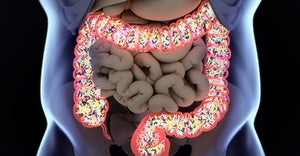Spotlight on the Plant Compound Berberine

As the incidence of health issues related to insulin resistance and carbohydrate sensitivity continues to skyrocket, we need all the tools we can get to help improve the health of people affected by these multifaceted conditions. Something receiving increased recognition for its impressive efficacy in affecting multiple parameters of metabolic health is a bitter, yellow plant extract called berberine. Berberine is so effective, in fact, that studies have shown it to be at least as effective as the commonly prescribed drug, metformin, for helping improve glycemic control.
Health issues related to insulin resistance are often accompanied by elevated fasting blood sugar and insulin levels, elevated hemoglobin A1c (a longer-term marker for blood sugar control), elevated post-meal blood sugar, elevated LDL-cholesterol, and elevated blood fats (triglycerides). Berberine has shown promise in affecting all of these factors, without some of the unpleasant side-effects of pharmaceutical drugs.1,2,3 These effects are quite significant, and berberine may be especially helpful for people whose blood sugar woes remains poorly controlled, despite a healthy diet, exercise, and an appropriate medication regimen. For those who are doing “all the right things,” but still don’t experience the expected improvements in health, berberine might be a powerful ally. Of course, these individuals need to work with their doctors when adding berberine to their nutrition regimens.
As for how berberine exerts these effects, there are multiple mechanisms. One of them is that berberine may help the body secrete more insulin and also use that insulin more effectively. Besides aiding the body in producing more insulin, berberine also helps to increase the amounts and efficiency of insulin receptors. Insulin can only do its job of escorting glucose into the cells when there are properly functioning insulin receptors available to receive it. So, berberine may support better glycemic control on two fronts: enhancing production of insulin, as well as facilitating proper usage of the hormone.
Another way berberine may help with carbohydrate intolerance is by inhibiting the action of some of the intestinal enzymes involved in digesting carbohydrates. In animal studies, berberine has been shown to reduce the duration of elevated blood sugar after the animals were dosed with sucrose and maltose—two types of sugar that are broken down in the small intestine.
Aside from its powerful effects on glycemic control, berberine has also demonstrated the ability to favorably impact blood lipids (cholesterol and triglycerides). Unlike statin drugs, however, berberine does not affect the complex pathway by which the body produces cholesterol internally, and therefore, does not present the many undesirable side-effects linked to statins.
The way berberine may help reduce LDL is similar to the way it helps insulin work better—it helps to increase the expression of LDL receptors. Like insulin, LDL particles can’t perform their function of delivering cholesterol to cells unless there are functional LDL receptors on which they can “dock,” like a ship arriving in a port to deliver cargo.
As mentioned earlier, it is important for individuals to work closely with their doctors and health care practitioners when considering such compounds as berberine. Opening the line of communication with practitioners is the key in addressing one’s health in a comprehensive and educated way.
Sources
- Yin J, Xing H, Ye J. Efficacy of berberine in patients with type 2 diabetes mellitus. Metabolism. 2008 May;57(5):712-7.
- Zhang H et al. Berberine lowers blood glucose in type 2 diabetes mellitus patients through increasing insulin receptor expression. Metabolism. 2010 Feb;59(2):285-92.
- Zhou JY et al. Chronic effects of berberine on blood, liver glucolipid metabolism and liver PPARs expression in diabetic hyperlipidemic rats. Biol Pharm Bull. 2008 Jun;31(6):1169-76.
- David Brady







Comments 0